Why is Ovarian Cancer Hard to Detect?
Ovarian cancer kills more women than any other cancer of the female reproductive system. With early detection, the 5-year survival rate is about 90 to 94 percent. Yet, only about 15 to 20 percent of ovarian cancers are found in the early stage. Sadly, about 14,000 women will die from ovarian cancer in 2021.1-3
There are some ways to screen for ovarian cancer. However, for average-risk women, screening is not recommended by the U.S. Preventive Services Task Force (USPSTF). This is because screening may cause more harm than benefit. Plus, screening was not found to lower the death rate.4,5
While early detection of ovarian cancer improves health outcomes, there are 3 reasons ovarian cancer is often missed in the early stages.
Ovarian cancer mimics other issues
Some signs and symptoms of ovarian cancer include:1,6
- Abdominal bloating
- Feeling of “fullness” after eating small amounts
- Unexplained changes in weight
- Fatigue
- Pain, especially in the back and pelvis
- Changes in digestion
- Urinating often
- Nausea
These symptoms can easily be explained by common health issues. This means doctors usually do not immediately suspect ovarian cancer. They may not pursue testing. In many cases, by the time a doctor suspects ovarian cancer, the cancer may have spread.1,2
Difficult exams
Ovarian cancers make tumors, but it is not easy to feel these tumors during a gynecology exam. This is especially true of early-stage ovarian cancer when tumors are small.7
Screening is lacking
Many cancers have well-defined screening criteria that catch early-stage cancers.
For example, the American Cancer Society recommends screening for cervical cancer every 3 to 5 years, starting at age 25. Cervical cancer screening is easy to do and is accurate in finding cervical cancer. This is not true for ovarian cancer. Ovarian cancer screening methods are invasive and not accurate.5,8
What are the screening methods for ovarian cancer?
Currently, there are 2 main screening tests. These are a transvaginal ultrasound (TVUS) and a tumor marker cancer antigen 125 (CA-125) blood test. TVUS looks for tumors in the reproductive system. TVUS cannot tell if these are benign or cancerous.2
A CA-125 blood test looks for a protein found with cancerous tumors. Ovarian cancer often, but not always, raises the level of CA-125 in the blood. However, CA-125 levels can also be high from non-cancerous conditions. For these reasons, ovarian cancer cannot be diagnosed solely on a CA-125 test result.2,3
TVUS and CA-125 screenings are not recommended for many
A 2018 report by the USPSTF does not recommend ovarian cancer screening for average-risk women without symptoms. USPSTF found that screening does not lower death rates. Plus, the risks of screening outweigh the benefits.4,5
Ovarian cancer screening can show false positives. This can prompt unnecessary testing, such as a risky surgical biopsy. Screening for ovarian cancer can affect quality of life and mental health.2,4,5
If you are high-risk, your doctor may pursue screening. Some factors that may put you at higher risk for ovarian cancer include:9
- Age, since ovarian cancer is usually diagnosed after age 40
- Being overweight
- Having kids later or having miscarriages
- Post-menopausal hormone therapy
- Family history of ovarian, breast, or colorectal cancer
Having 1 or more risk factors does not mean you should get screened for ovarian cancer. These risk factors could raise your risk of ovarian cancer. It does not mean you will get it.9
Why is screening limited?
The combination of nonspecific symptoms and the ovaries being hard to examine limits screening opportunities. Plus, doctors have not found a sensitive and accurate blood test that can detect early-stage ovarian cancer. More research is needed to find a better blood test. Better imaging techniques would also help catch ovarian cancer earlier.2,7
Until better screening methods are developed, knowing your body can help keep you healthy. If you notice changes that may seem mild, but you feel that something is wrong, talk to your doctor. You are your best advocate.

Join the conversation